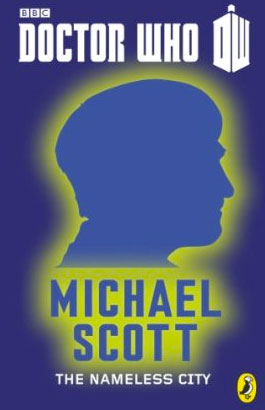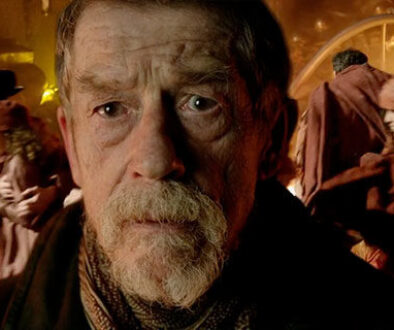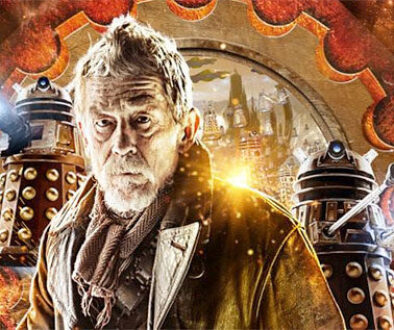The Nameless City Review
Patrick Kavanagh-Sproull gives his verdict on second 50th anniversary short story.
See my review of last month’s instalment A Big Hand For The Doctor here.

Last month, this series got off to a mediocre start; Eoin Colfer’s eBook A Big Hand For The Doctor failed to impress me and I was left with a bad feeling that the chosen authors may not be big fans. This is a real issue because if you choose a famous writer then do your research and find out if they’re a diehard fan. Eoin Colfer in my opinion had no interest in the show and abused his position by inventing malarkey about the First Doctor that wasn’t part of the show. Some contested that Colfer was just having fun but I resent that: stick to what you’re given. Doctor Who is hitting its fiftieth year with a legacy behind it. When you have the chance to pen an important story, acknowledge continuity because fans really hate it when you neglect this. Hopefully Mr. Michael Scott will set the bar but you never know. So here we are again at The Nameless City.
The author.
When the news was announced that Michael Scott was to be the next penman in the series I thought… who? I had no idea who this man was: I hadn’t seen any of his novels in bookshops nor heard even a mention of his name anywhere. To me, Michael Scott was anonymity, and so I did a bit of research on him. The series he is most famous for: The Secrets of the Immortal Nicholas Flamel rung no bells and I thought the BBC had just made him up for these bimonthly books. When I saw him talking about The Nameless City (see below) I was thrilled. I had no idea who he was but his muted enthusiasm stuck out for me and he genuinely seemed very pleased to be penning the next eBook. He also gave the impression that he was a real fanatic of the Troughton era and I thought, great!
Let’s hope that the quality of his book matches his personality.
The Doctor.
Patrick Troughton succeeded the rather sharp William Hartnell in the role of the Doctor and soon made the position his own. Usually characterised as a tomfool or a clown, or once a “space hobo” the Second Doctor had his own style, much different from his predecessor. In The Nameless City we can only pray that Scott sticks to the set character (not deviating like a certain Mr. Eoin Colfer) and get Patrick Troughton right.
Opinion
It is obvious from the off that Michael Scott enjoyed penning The Nameless City. He relishes in describing Jamie and the Doctor, giving accurate accounts of their characters. Scott also uses suspense to his advantage, building up tension and excitement before introducing his audience to a chilling new world.
The Second Doctor is just like how Troughton portrayed him and this is relieving; the leading author Eoin Colfer designed his own character much to my disappointment. With his crooked bowtie and chequered trousers, Scott has done his research, and the same can be very much said for the Doctor’s faithful companion, Jamie. He may stereotype the Scotsman but he gets everything right, from his brown mop of hair to his tartan kilt.
Scott has created his own monsters, the Archons, absolutely brilliant creations; I got an image of them in my mind and they seem terrifying. Creatures of the dark, these octopus-like beings reside on a black barren planet with an ebony glass city that hides sinister secrets.
Plot-wise the story is fairly simple but inventive. When the TARDIS suffers a malfunction, the Doctor and Jamie land in 60s London (a popular destination for these eBook writers) and whilst the Time Lord attempts to fix the ship, his assistant goes off touring the city. After receiving a mysterious book as a gift (look out for a familiar face here, only certain fans will notice this), Jamie returns it to the TARDIS where this bound volume turns out to have otherworldly powers, sending the time machine to the furthest reaches of the universe. It’s a great if recycled concept and executed perfect… however there were a couple of bugbears that detracted my enjoyment of the story (there always is, isn’t there?)
Firstly, because I was raised as a pedantic Whovian, the TARDIS does not have audio records. In The Nameless City, the Doctor requests information on the titular metropolis and receives everything he needs via a vocal archive. Basically, the TARDIS talks as a woman. I had the same complaint with Colfer, why touch on subjects that are hazardous to fans? You were recruited for the series to deliver an enjoyable if brief adventure for each Doctor, and the book is only forty or so pages long, why cause controversy?
Neil Gaiman’s episode, The Doctor’s Wife dealt with the topic of the TARDIS talking delicately and the result was widely accepted by fans. Gaiman had Steven Moffat and other producer’s help in orchestrating his episode and how to tackle the dainty issue, whereas Scott probably had Google as his only aid in writing. The actual scene in which a dishevelled Doctor demands knowledge on the city is brief, very brief in fact and the idea of having the TARDIS provide the info is only in there because at that time there is no means of getting the desired particulars.
The climax is dramatic and the monsters, the Archons themselves alongside their servants pose a grave danger to the Doctor and Jamie. Though, as I read the resolution I couldn’t help think that there was a better solution, seeing as the one Scott gave us played on plot conveniences.
Nevertheless it’s a big step-up from last month’s disappointing instalment, and yes it does have some faults but not so many as to detract pleasure. I generally enjoyed it and Scott succeeded in giving us a funny and dark tale that does the Second Doctor justice.
Final Verdict: 8/10








